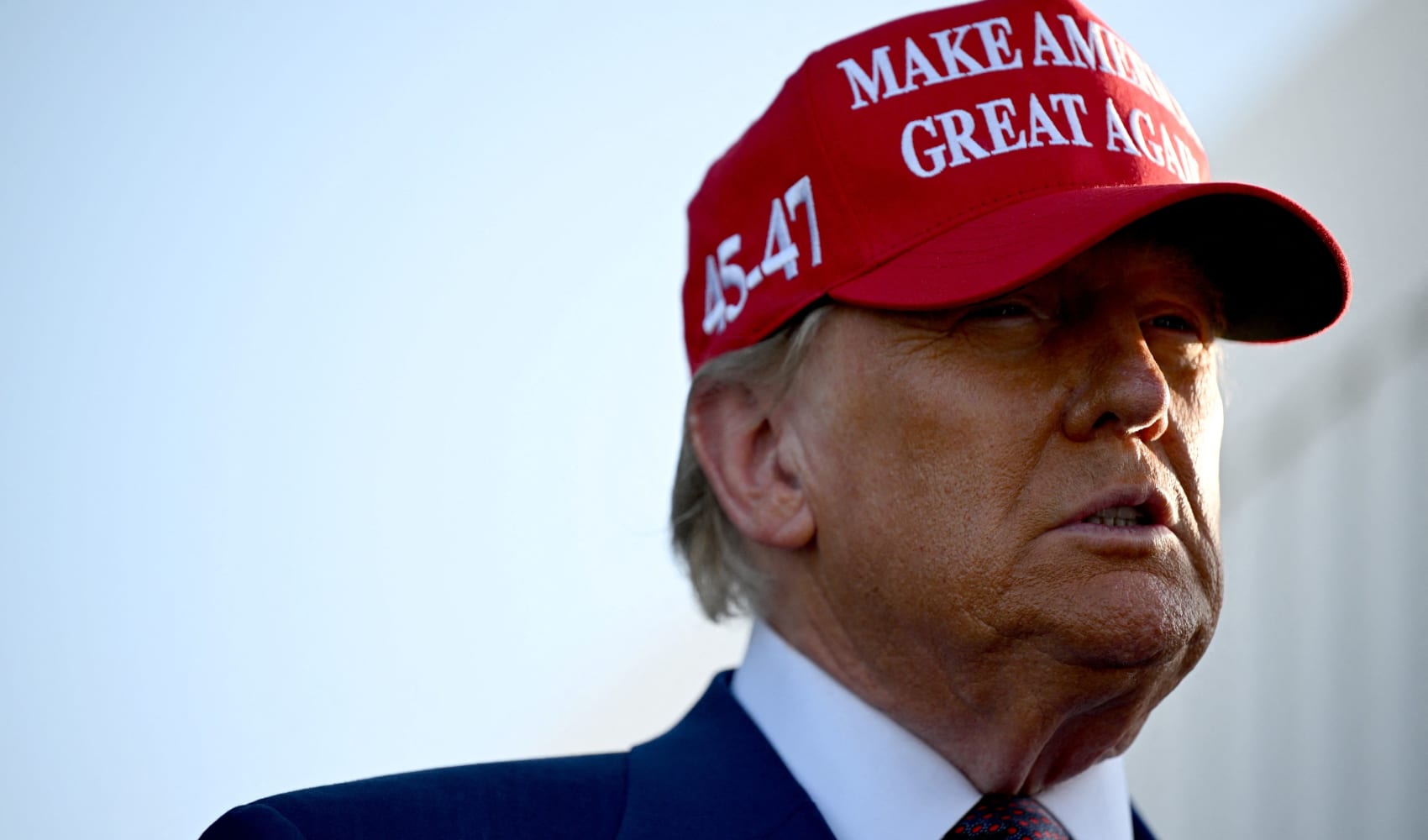
This was CNBC's live blog tracking developments on the war in Ukraine.
Russia's latest non-strategic nuclear weapons drills are being watched closely by Ukraine and the West, coming at a time when Moscow is warning Kyiv's Western allies against any direct involvement in the war in Ukraine.
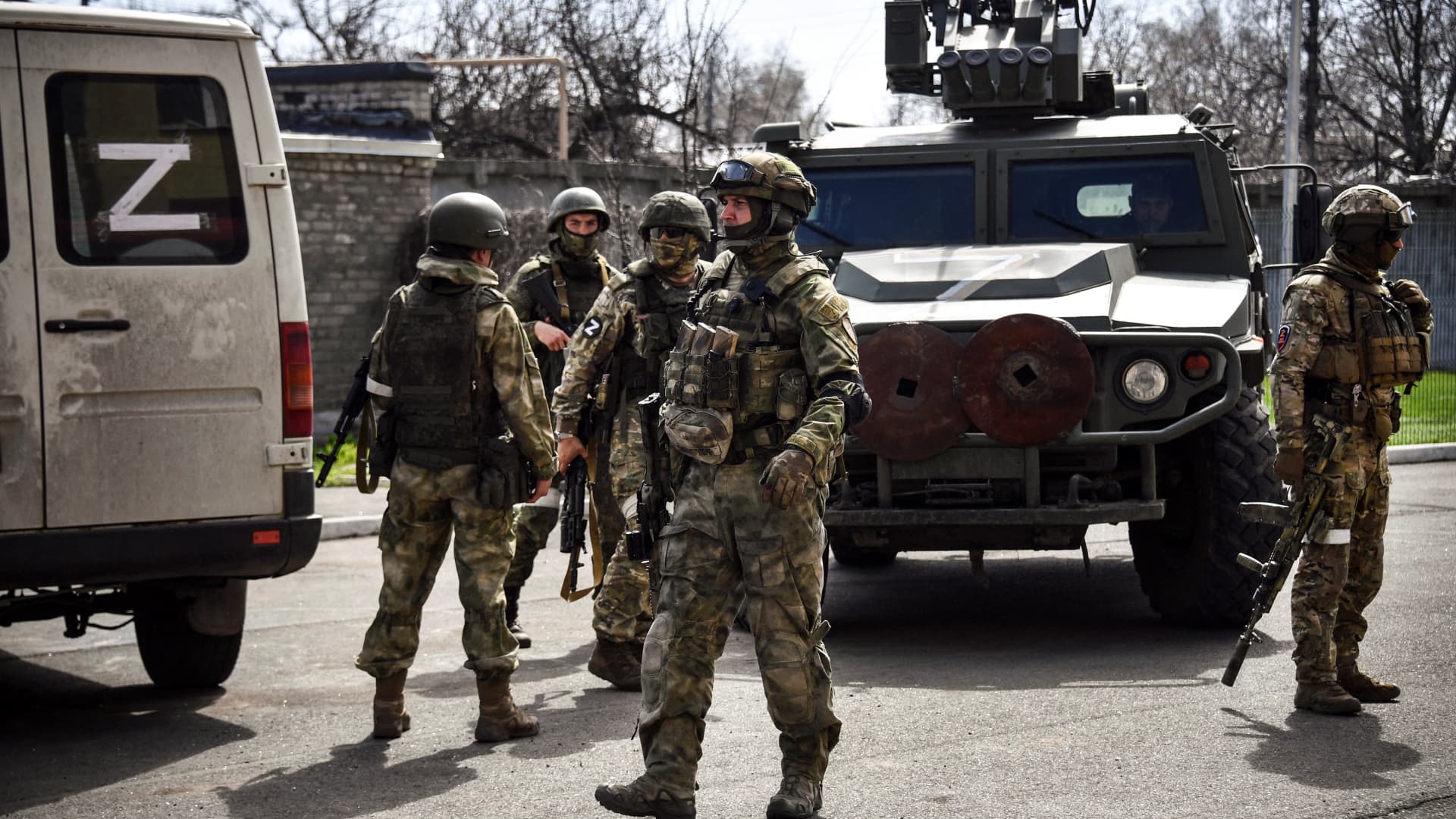
Announcing the exercises earlier in May, Russia's Ministry of Defense directly linked the exercises to "provocative statements and threats of individual Western officials against the Russian Federation."
Get top local stories in Philly delivered to you every morning. Sign up for NBC Philadelphia's News Headlines newsletter.
Earlier this week, Ukraine's President Volodymyr Zelenskyy called on allies to get more directly involved in the war, such as by helping to intercept Russian missiles.
The Kremlin accused Zelenskyy of "hysterics" and said Kyiv's request was due to "unfavorable conditions" for Ukraine on the battlefield.
Russian strikes wound 10 people in Kharkiv
Money Report
A Russian airstrike on Ukraine's northeastern city of Kharkiv destroyed a cafe and left 10 people wounded, Reuters reported Wednesday.
A 12-storey high rise also had its windows blown out and a trolleybus was severely damaged, according to the reports. CNBC was unable to independently verify the claims.
— Karen Gilchrist
Russian proposal to change Baltic Sea border is deleted from document portal
A Russian defence ministry proposal for a draft government decree to change the Russian border in the Baltic Sea was deleted from an official Russia document portal on Wednesday.
"The draft is deleted," the site said on the address where the document had earlier been visible.
— Reuters
Germany, Lithuania and Finland seek clarity from Russia over Baltic Sea plan
The German, Finnish and Lithuanian governments say they are awaiting more clarity from Russia following a proposal by the country's defense ministry suggesting a change to how its Baltic Sea maritime border is determined.
"Of course we are observing the situation closely," a German government spokesperson told a regular press conference on Wednesday, according to Reuters.
Finland's Prime Minister Petteri Orpo said that Helsinki will monitor Russia's proposal, but tried to downplay concerns by reportedly saying that any review by Moscow is likely to be routine and not something to worry about, Reuters noted.
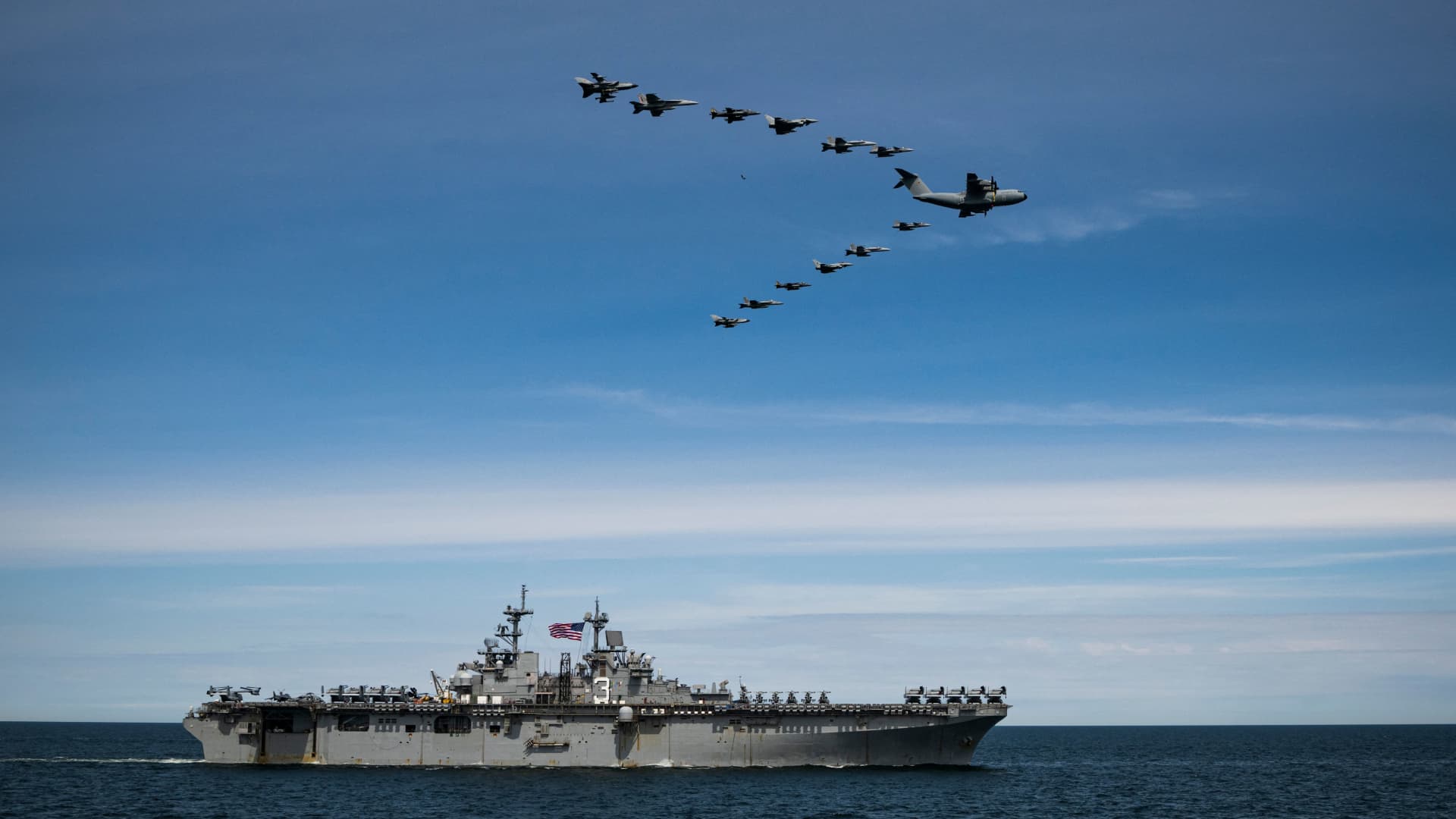
Lithuania's foreign minister said that any plan to amend the borders of the country's territorial waters in the Baltic Sea is an escalation against NATO and the EU.
"Another Russian hybrid operation is underway, this time attempting to spread fear, uncertainty and doubt about their intentions in the Baltic Sea," Foreign Minister Gabrielius Landsbergis said on social media platform X.
Russia has sent mixed messages over a reported proposal by the Russian defense ministry to change how Russia's maritime border is measured. An unnamed "military-diplomatic" source was quoted by Russian state new agencies denying the report, but the Kremlin neither confirmed nor denied the move. when asked if the proposal was politically motivated.
— Holly Ellyatt
Russia rapidly restoring energy facilities: Novak
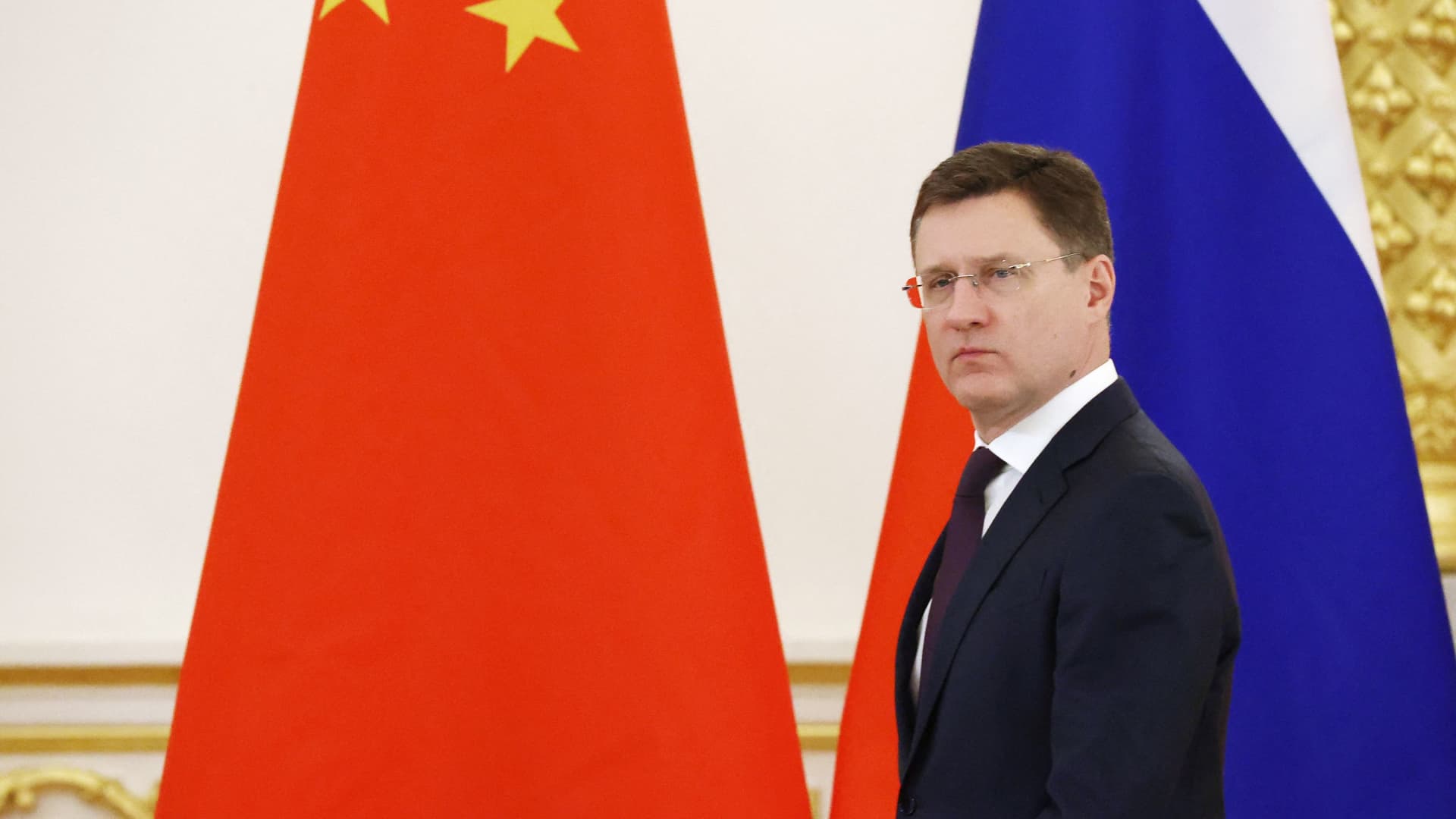
Russian energy facilities are being rapidly restored following drone attacks, Russian Deputy Prime Minister Alexander Novak said in an interview with Russia-1, according to Google-translated comments carried by state news outlet Tass.
"Of course, it is impossible to exclude [attacks] 100%. Sometimes the situations that happened happen," he noted. "Nevertheless, restoration is proceeding at a rapid pace in order to ensure the operation of enterprises in full."
Moscow is also improving the protection of its energy infrastructure, he noted, adding that this work is currently ongoing.
On Sunday, Moscow reported that Ukraine launched an extensive 62-drone attack on Russian regions, Reuters reported. The Interfax news agency said that the oil refinery in Slavyansk halted work following the offensive.
Russia is a key global oil and gas producer, with threats against its hydrocarbon infrastructure adding to supply-side pressures in the energy market.
— Ruxandra Iordache
Russian forces claim to have seized village near Bakhmut
Russian forces have seized the village of Klishchiivka in Donetsk in eastern Ukraine, the country's defense ministry said on Telegram Wednesday.

The village is close to the city of Bakhmut, a hotspot of intense fighting before its capture in May 2023. CNBC was unable to verify the claim and Ukraine has not commented.
— Holly Ellyatt
Sweden to supply Ukraine with $7 billion of military support over three-year period

Sweden will supply Ukraine with an additional 75 billion Swedish krona ($6.98 billion) of military support over the next three years, Swedish Prime Minister Ulf Kristersson said in a video address on Wednesday.
"Sweden's government, together with our cooperating party in the Parliament, have agreed for a new framework for long-term support to Ukraine - comprising 6.5 billion euro or 75 billion SEK in military support to Ukraine from 2024 to 2026," he said.
"This support will help fund long-term donations of additional military material and the purchasing of new material for direct supply from the defense sector to Ukraine. Ukraine's cause is Sweden's cause. We will support you for as long as it takes," Kristersson added.
The additional military funding package "demonstrates Sweden's practical solidarity with Ukraine in our struggle for freedom," Ukrainian President Volodymyr Zelenskyy said on social media platform X, welcoming the donation.
Sweden has assisted Ukraine with military, humanitarian and civil support since the February 2022 start of Moscow's invasion, contributing an approximate 37 billion Swedish krona to date, according to Swedish government figures. Escalating regional tensions also pushed Stockholm to abandon its long-standing position of neutrality and formally adhere to the NATO military coalition in March last year.
— Ruxandra Iordache
Kremlin neither confirms nor denies Baltic Sea border proposal
The Kremlin seemed uncertain about a proposal by Russia's defense ministry that appeared to suggest amending the country's maritime borders in the Baltic Sea.
Russian news agencies reported Wednesday an unnamed "military-diplomatic" source who said "there was and is no intention to revise the width of the territorial waters, the economic zone, the continental shelf off the mainland coast and the state border line of the Russian Federation in the Baltic.″
But when asked by reporters whether there was a political motive to the ministry's proposal, Kremlin Press Secretary Dmitry Peskov neither confirmed nor denied the proposal, saying instead that "there is nothing political here, although the political situation has changed significantly," he said, Interfax news agency reported.

"You see how tensions and the level of confrontation are escalating, especially in the Baltic region — this requires appropriate steps from our relevant departments to ensure our security," he replied.
"But on the details, again, I am not entirely competent, I recommend that you contact the Ministry of Defense," he said.
— Holly Ellyatt
Russia denies it wants to revise Baltic Sea border
Russia denied that it has any intention of revising its maritime border with Lithuania and Finland in the Baltic Sea.
State media agencies TASS, Interfax and RIA Novosti reported a denial by an unnamed "military-diplomatic" source who said "there was and is no intention to revise the width of the territorial waters, the economic zone, the continental shelf off the mainland coast and the state border line of the Russian Federation in the Baltic."
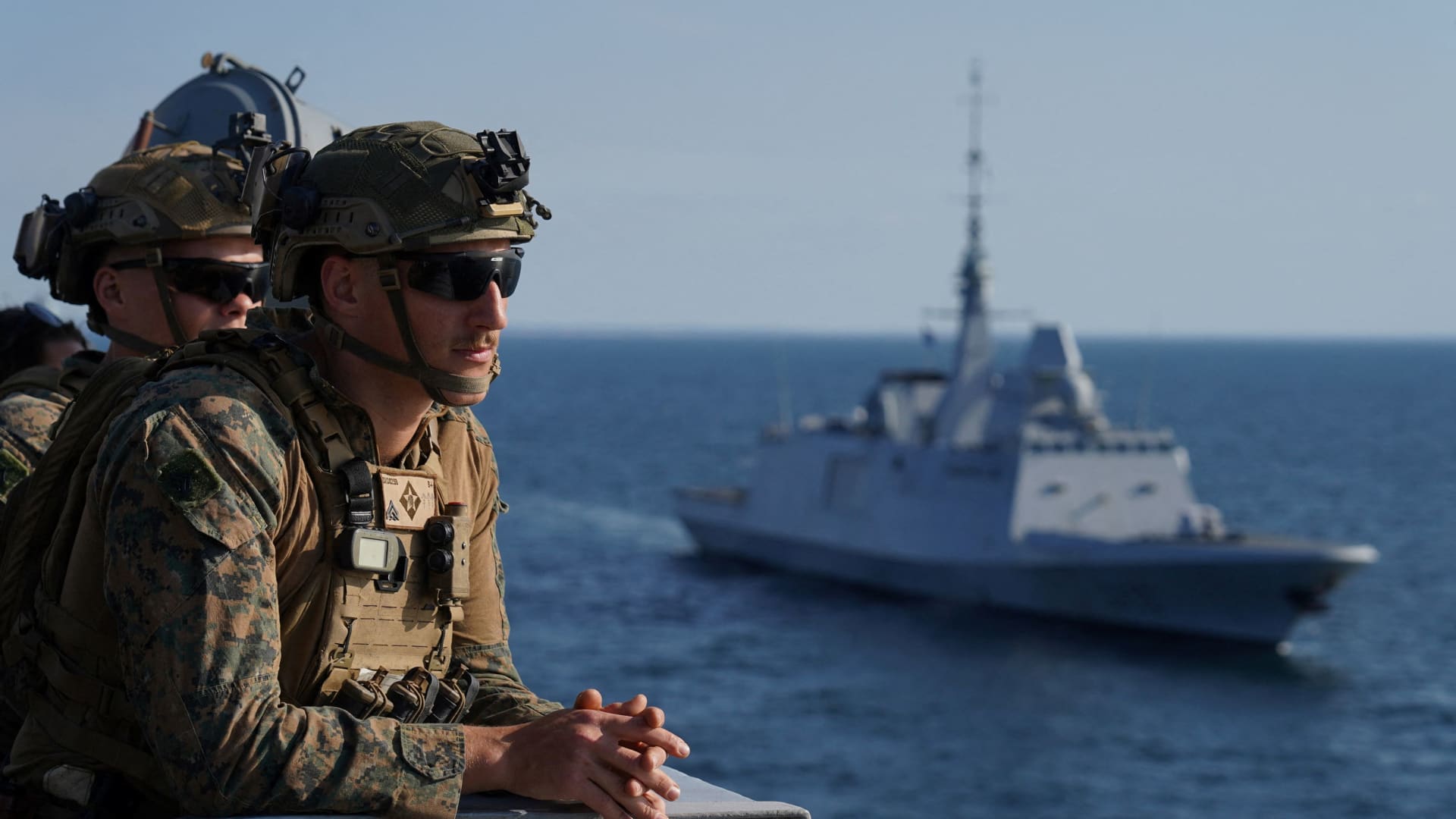
The comment came after Russia's Ministry of Defense reportedly issued a statement Tuesday in which it appeared to propose a revision to the way Russia's state borders with Lithuania and Finland in the Baltic Sea are measured.
The Baltic Sea has become a frequent flashpoint for tensions between Russia and its NATO neighbors during the war with both accusing each other of various attempts at "sabotage," ranging from the explosion of Nord Stream gas pipelines in late 2022 to damage to other undersea infrastructure, including telecoms cables.
— Holly Ellyatt
Seven wounded in Russian attack on northeastern Chahuiv

Seven people were injured during a Russian attack on the northeastern town of Chahuiv in Ukraine's Kharkiv region, a Ukrainian official said Wednesday.
Kharkiv's regional governor Oleh Syniehubov said in Google-translated Telegram updates that a kindergarten was damaged when missiles struck the center of the town. No children were injured, but a number of adults were hospitalized following the attack, he noted.
CNBC was unable to independently verify the information.
Russia denies targeting civilians during the war. At least 30,000 non-combatants have been killed or injured during drone and missile strikes against residential buildings and other civilian infrastructure, according to the UN Human Rights Monitoring Mission in Ukraine. The figure is likely a conservative one, given the complexities of accurate data recording during the conflict.
— Holly Ellyatt
Russia denies U.S. claim that Moscow deployed anti-satellite weapon in space
Russian Deputy Foreign Minister Sergei Ryabkov on Wednesday denied a U.S. assertion that Russia has launched an anti-satellite weapon.
Ryabkov said Moscow opposed the deployment of weapons in orbit, the TASS and Interfax news agencies reported.
Ryabkov said Russia was still complying with quantitative restrictions on nuclear weapons set out by the New START treaty between Moscow and Washington.
— Reuters
Russia's tactical nuclear weapons drills meant to send a warning to the West
The timing of Russian non-strategic nuclear weapons drills that began on Tuesday is not accidental and will certainly be watched closely by Ukraine and the West.
The exercises come at a time when Russia is repeatedly warning Kyiv's Western allies against any direct involvement in the war in Ukraine, including any potential deployment of ground troops.

Non-strategic or tactical nuclear weapons are designed for use on the battlefield and are able to erase specific targets, such as military bases or training centers. While they are less devastating than strategic nuclear weapons that can wipe out entire cities, their employment in the latest drills has made Russia's intentions clear with the drills designed to send a warning to Russia's adversaries.
Announcing the exercises earlier in May, Russia's Ministry of Defense directly linked the drills to "provocative statements and threats of individual Western officials against the Russian Federation."
Russia has been particularly displeased by French President Emmanuel Macron's suggestion that he wouldn't rule out French ground troops being deployed in Ukraine. The U.K.'s Foreign Minister David Cameron has also caused uproar saying Ukraine is free to decide whether to use long-range missiles against targets within Russia.
Earlier this week, Ukraine's President Volodymyr Zelenskyy called on allies to get more directly involved in the war, such as by helping to intercept Russian missiles. The Kremlin accused Zelenskyy of "hysterics" and said that Kyiv's request was due to "unfavorable conditions" for Ukraine on the battlefield.
— Holly Ellyatt
U.S. assesses Russia launched space weapon in path of American satellite
Russia last week launched a satellite that U.S. intelligence officials believe to be a weapon capable of inspecting and attacking other satellites, the U.S. Space Command said on Tuesday as the Russian spacecraft trails a U.S. spy satellite in orbit.
Russia's Soyuz rocket blasted off from its Plesetsk launch site some 500 miles (800 km) north of Moscow on May 16, deploying in low-Earth orbit at least nine satellites including COSMOS 2576, a type of Russian military "inspector" spacecraft U.S. officials have long condemned as exhibiting reckless space behavior.
"We have observed nominal activity and assess it is likely a counterspace weapon presumably capable of attacking other satellites in low Earth orbit," a USSPACECOM spokesperson said in a statement to Reuters.
"Russia deployed this new counterspace weapon into the same orbit as a U.S. government satellite."

COSMOS 2576 resembled previously deployed counterspace payloads from 2019 and 2022, the statement added, referring to past Russian tactics of deploying satellites close to sensitive U.S. spy satellites.
U.S. intelligence agencies had been expecting the launch of COSMOS 2576 and informed allies of their assessment of the satellite before its deployment in space, according to a U.S. official familiar with the intelligence. The launch also included civilian satellites deployed to different orbits.
— Reuters
Russia begins exercise with tactical nuclear weapons
Russian forces on Tuesday began the first stage of training in the "preparation and use of non-strategic nuclear weapons," the Ministry of Defense said in a post on Telegram.
"As part of this stage, the personnel of the missile formations of the Southern Military District are practicing combat training tasks of obtaining special ammunition for the Iskander operational-tactical missile system, equipping launch vehicles with them and covertly advancing to the designated position area in preparation for missile launches," the post read.
President Vladimir Putin ordered the drills earlier this month in a move he said was designed to deter military involvement in Ukraine by the West.
— Karen Gilchrist
Russia arrests former army commander on suspicion of fraud

The former commander of Russia's 58th Army, who last year decried the treatment of the military personnel on the battlefield, was arrested on suspicion of large scale fraud, TASS news agency reported Tuesday.
Major General Ivan Popov was ordered by the country's military court to be detained for two months, TASS said. Popov's lawyer said he had appealed the detention, Reuters reported Interfax as saying.
"The ex-commander of the 58th Guards Combined Arms Army, Ivan Ivanovich Popov, was arrested on suspicion of fraud," the agency's interlocutor said, according to TASS.
Last July, Popov said he was dismissed after a four-minute audio message emerged, in which he outlined major shortcomings in Russia's defenses and said they had caused mass casualties among his troops on the battlefield in Ukraine.
— Karen Gilchrist
Kremlin says Zelenskyy is asking for more Western help because he knows army is in trouble
The Kremlin said Tuesday that Ukrainian President Volodymyr Zelenskyy's latest appeal for more Western aid and involvement in the conflict is due to Ukraine's "extremely unfavorable" situation on the battlefield.
"Various representatives of the Kyiv regime and Zelenskyy himself have been making many statements in recent days, sometimes actually slipping into hysterics. This is due to the extremely unfavorable position of the forces of the Kyiv regime at the fronts," Kremlin Press Secretary Dmitry Peskov said, in comments translated by NBC News.
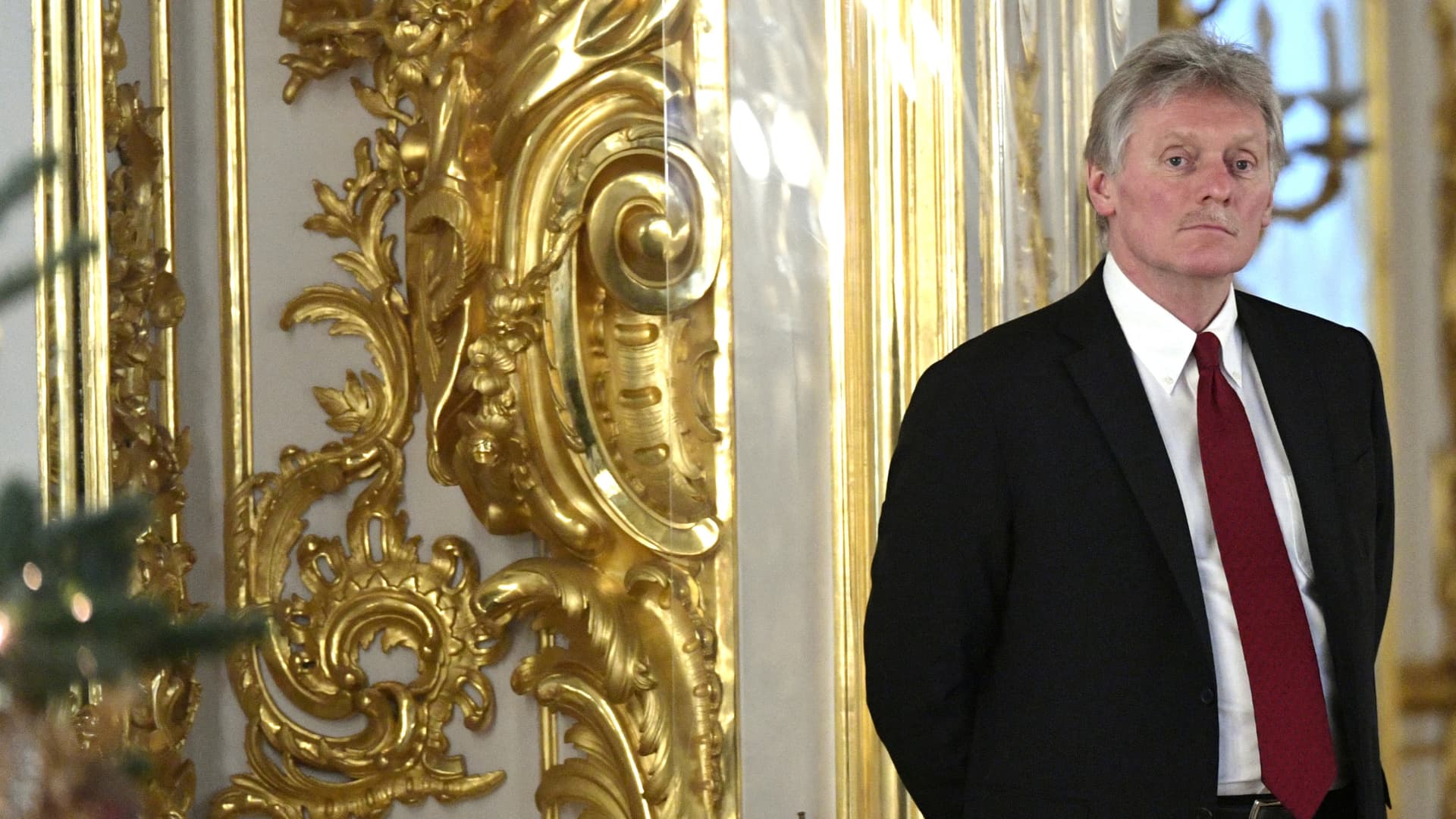
"This is also due to the quite difficult situation in which the Ukrainian military finds itself, despite all the promised help. The] [supplies- are not as regular as hoped for. And most importantly, there is a growing understanding that even if this rhythm of military supplies is restored, this will still not allow the Ukrainian Armed Forces to change the dynamics at the fronts. This understanding is growing and it does not add confidence or balanced judgment to the Kiev regime representatives," he added.
Peskov's comments come after Zelenskyy told Reuters Monday that he was trying to get Ukraine's partners more directly involved, asking them to help intercept Russian missiles and to allow Ukraine to use Western weapons against Russian military equipment at the border and targets inside Russian territory.
He said he understood they were wary of antagonizing Russia, however. "It's a question of will," Zelenskyy told the news agency. "But everyone says a word that sounds the same in every language: everyone is scared of escalation."
Zelenskyy told Reuters that the situation on the front lines had stabilized in the last week, though he conceded that Ukraine's forces had been in a more difficult position after Russia launched a new offensive in the northeast.
— Holly Ellyatt
Finland calls on EU to help prevent 'weaponized' migration from Russia

Finland called on the European Union to help prevent what it calls "instrumentalized" or "weaponized" migration at its border with Russia.
Finland has closed its borders with Russia in recent months, accusing the country of deliberately sending undocumented asylum seekers to its border in order to try to destablize the country, a new NATO member. Moscow denies the accusation.
On Tuesday, the Finnish government submitted a proposal to parliament on a new border security law that would allow border agents to prevent migrants who are seen as "instruments of influence" from entering from Russia.
"It is the government's duty to ensure the security of the borders, Finland and Finns in all situations," Prime Minister Petteri Orpo told a news conference, in comments reported by Reuters.
"Unfortunately the EU legislation does yet not provide us with effective tools to tackle the problem. I hope our work will pave the way for European level solutions," he added.
— Holly Ellyatt



